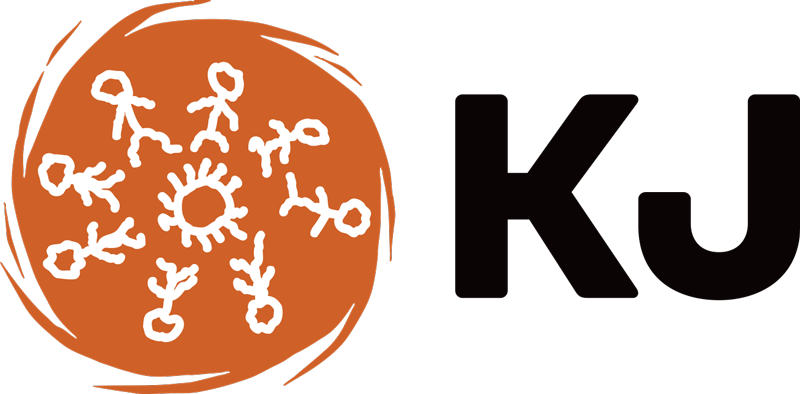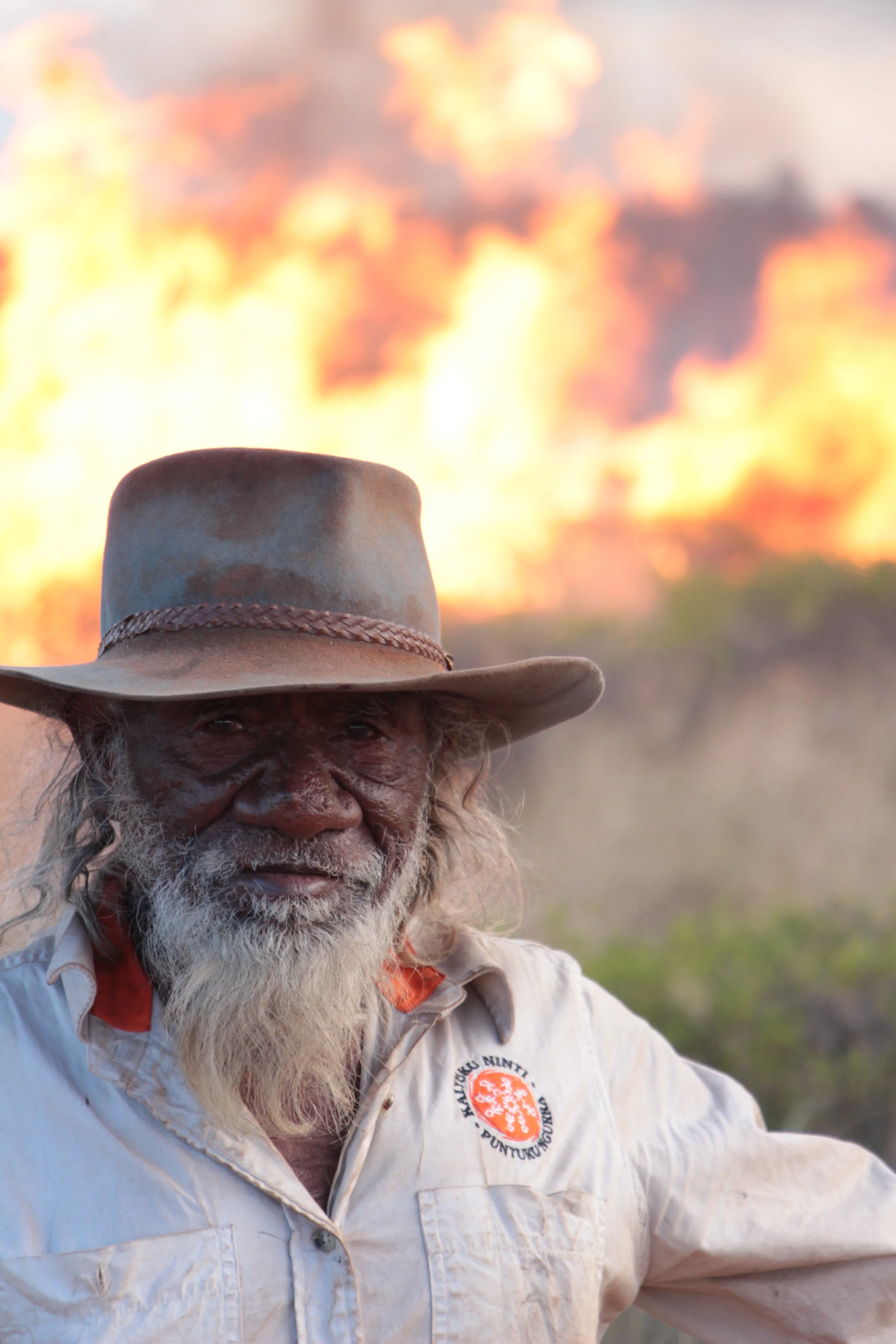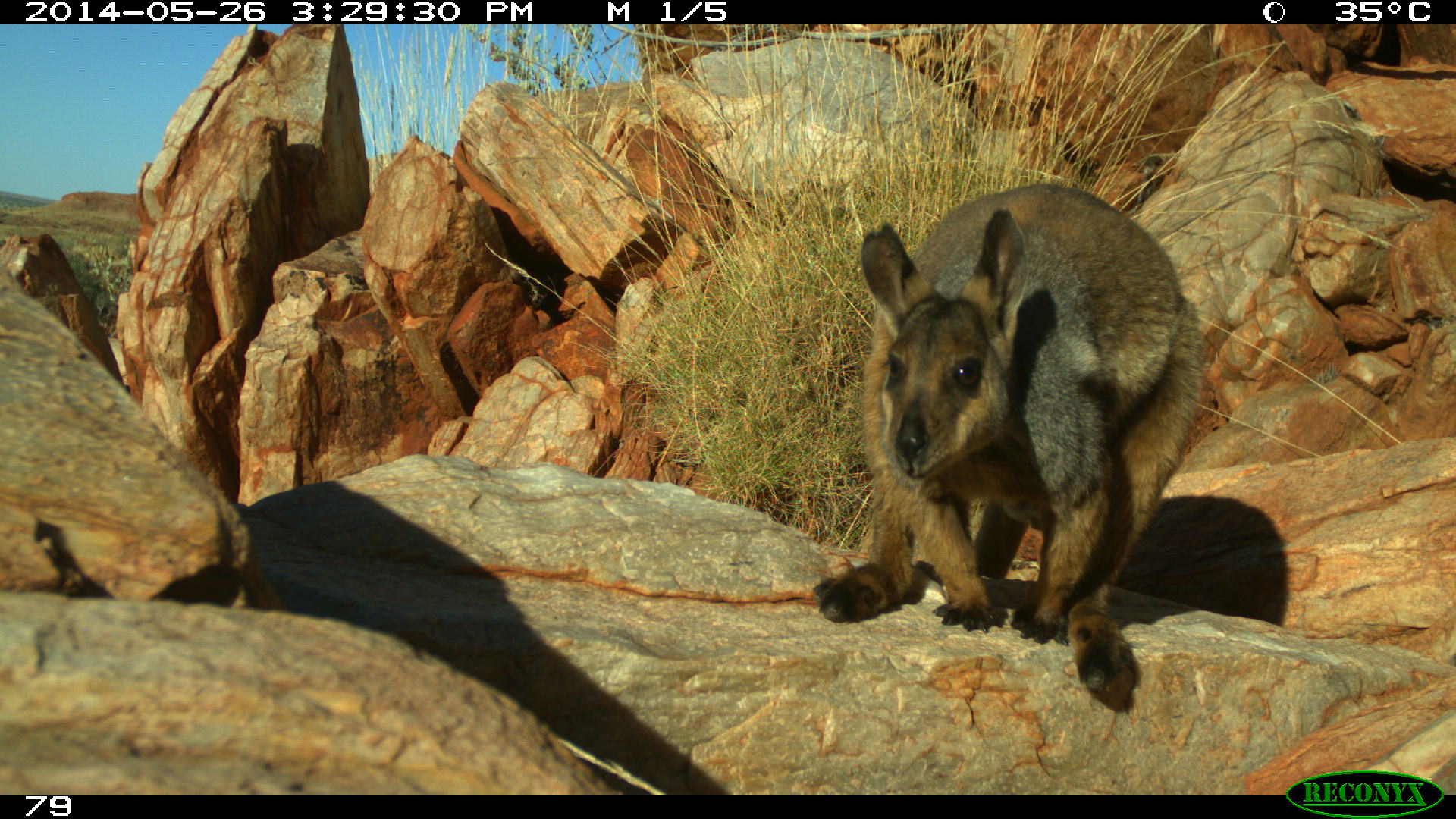Media + Films
Keeping Pakulyarra Safe - A 40-Year Success Story
In 2013, KJ Martu Rangers from Jigalong helped move 26 pakulyarra (black-flanked rock-wallabies) from Kaalpi to Pinpi to keep them safe.
Kiriwirri (Kalyuku Ninti 2023)
"I feel so good to come home and show my family where we lived. Teaching and showing them where we walked a long time ago, and our knowledge of the water places." Nola, Pujiman (desert-born) Elder.
Connecting Through Cultural Exchange
During a cultural exchange trip to celebrate collaboration and connections between Indigenous women ranger teams, a group of KJ Rangers from Punmu and Kunawarritji communities had the amazing opportunity to visit Mparntwe (Alice Springs) to meet traditional owners and local ranger groups.
Wirnpa (Kalyuku Ninti 2023)
During the 2023 Kalyuku Ninti trip, 59 traditional owners from Martu and Kulyakartu native title determinations visited Wirnpa, one of the most powerful ancestral beings of the Jukurrpa (Dreaming). The purpose of the visit was to educate the younger generations about Wirnpa and the importance of respecting and caring for him and Country.
Elders' Celebration + KJ Martu Cup
Martu from Jigalong, Parnngurr, Punmu, Kunawarritji, and Newman communities came together to celebrate their remarkable Elders and participate in the KJ Martu Cup.
Kalyuku Ninti 2022
KJ Kalyuku Ninti trips are transformative return to Country journeys that bear the essence of family pilgrimages to sacred places. These expeditions not only provide an opportunity for cultural reproduction but also serve as a foundation for extensive environmental engagement. Kalyuku Ninti, meaning "knowledge of waterholes," reflects the core wisdom that elders must impart to the younger Martu generation, ensuring the preservation of their rich cultural heritage necessary for the continued prosperity of their traditions and the sustainable stewardship of their ancestral lands.
Martu Youth Program
The “Reconnecting Martu Youth with Country” program is a societal and community-based response that aims to engage Martu at-risk youth in the 14–18-year age bracket in on-country trips and camps.
Ngurra Karti (getting Back Home Program)
Ngurra Karti (The Getting Back Home) program has enabled Martu to return back to their communities in a timely manner. The program has reduced the time Martu spend in town and therefore exposure to toxic influences which exacerbate substance abuse, violence and destructive cycles or behaviours.
Mitirlpa (Connectivity for Community: Access, Equity, Empowerment)
The Mitirlpa (Staying at Home) program aims to improve the quality of life in desert communities by enabling access to improved digital infrastructure and improved access to a range of government and commercial services and transactions. Martu live in one of the most remote places in the world and are physically removed from services and the infrastructure needed to access those supports quickly. For instance, to undertake basic transactions such as activating a new bank card, Martu often travel between 5 and 12 hours one way to the nearest town.
Elder Profile - Minyawu Miller
Minyawu was born ca 1944 at Pungarnu in the north of Martu country, and grew up in the Punmu area. He is the last Warnman speaker. As a young man, he was one of the last Martu to leave the desert. In 1966 he was instructed by elders to travel north to see if there was anyone left in the desert. This journey took him a 1000 kms walking from the Karlamilyi river up to Anna Plains station in the far north and back again.
Wanyja Mankarr
In one of the most remote parts of Australia live some rare and threatened animals. One such animal is the bilby. Once common across Australian deserts, the bilby is now endangered. Its last stronghold in the wild is on Martu country. Martu rangers are working with Kanyirninpa Jukurrpa to look after country and the bilby’s habitat by using a combination of Martu and whitefella ways.
Kanyirninpa Jukurrpa
KJ has strong partnerships with a number of organisations. These long-term partnerships are based on a shared vision, respect, mutual trust and a desire to assist Martu in looking after country and culture. The knowledge and skills contributed by each partner have served to foster outcomes that would be difficult to achieve for either partner alone. See and hear from Martu about some of the highlights of KJ’s activities for the past year.
Wama Wangka — talking about alcohol
Most Martu and their communities have been directly affected by the consumption of alcohol. There are few resources, however, that are designed to address the unique cultural, social and linguistic challenges faced by Martu in WA’s remote Western Desert. Wama Wangka (Martu’s version of Alchoholics Anonymous) is providing an opportunity for people to talk about their experience of alcohol abuse and make plans to combat these issues themselves.
Kakarra not Yapurra
“We don’t want to send anyone to yapurra (west, to prison) and want everyone to be kakarra (east, to Martu homelands) where they can live in paradise with their ancestors.” — MLP mentor, Butler Landy
In 2017, participants from the Martu Leadership Program were involved in a three-day camp to talk about the criminal justice system. Over 100 people were present, including key law agencies, departments and organisations. Everyone was keen to explore new methods within the criminal justice system that would give better outcomes for Martu and the broader community.
“Burning to save Australia's Western Desert” — Al Jazeera report
The Martu are the Indigenous peoples of a large area of Australia's Western Desert. The traditional owners of those lands, the Martu, practised small-scale "land burning" for tens of thousands of years. The burning encouraged a regrowth of diverse vegetation across the landscape that would then make large-scale bushfires less likely to occur.
Celebrating our partnerships
KJ has strong partnering relationships with a number of organisations. These long-term partnerships are based on a shared vision, respect, mutual trust and a desire to assist Martu in looking after country and culture. The knowledge and skills contributed by each partner have served to foster outcomes that would be difficult to achieve for either partner alone.
Walk to Gather
The passing of elders is one heartfelt concern for many younger Aboriginal people as elders retain the ancient foods, practices and knowledge of Australia. To counteract this threat, four generations of women gather together to teach about bush food and medicine plants of their desert country. These grandmothers are keeping alive the skills of food preparation And no one in the world has such expertise of Australian bush tucker.
Songs of the Dance
“This belongs to the ancestors, this dance. This is their law that belongs to all the Martu people. The songs that belonged to the place from the Dreamtime. Our grandfathers taught us how to dance in the past. They taught us and sang the songs when we were children. We need to show the children and give it to them. These children must be taught how to dance. This is very important for them. Forever it's their law.”
Warru (Black-flanked rock wallaby) Project
In a remote part of Western Australia lives an endangered species of rock wallaby. Although known to the local Martu people, this population of endangered species was one of the last known populations in the Western Desert. Constantly hunted by feral predators, particularly wild cats and foxes, the rock wallabies were in danger of disappearing all together. This documentary shows rangers at work establishing a new colony of rock wallabies to help secure their survival for the future.
Martu Leadership Program
The Martu Leadership Program (MLP) started in 2014 with men, then late 2016 with women. This short movie captures what the program means to participants. Annabell Landy says that by learning and focussing, she can be a role model for people in her community; while Clifton Girbirba explains the importance to teach white law to people, because it’s “two laws colliding”. Explore the evolution of the MLP through the stories of the Martu who have been involved.




















